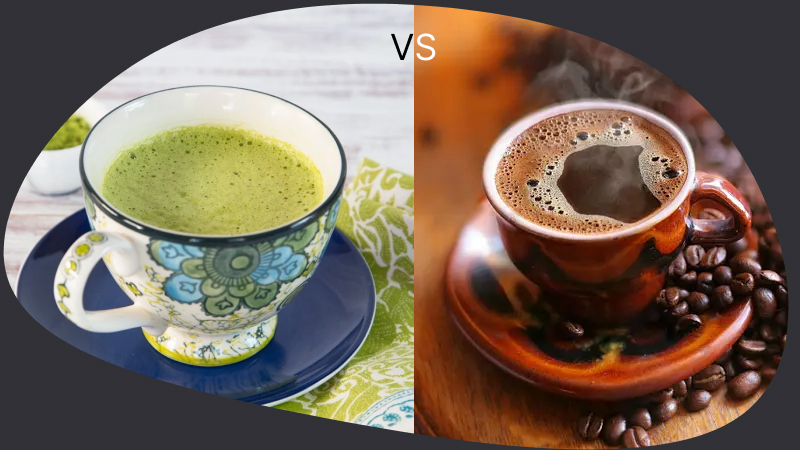
- Home
- Learn About Matcha
- Matcha vs. Coffee: Which is better for energy and concentration?
Matcha vs. Coffee: Which is better for energy and concentration?
Advantages and disadvantages of matcha and coffee
| Criteria | Matcha | Coffee |
|---|---|---|
| Contents caffeine | 40-90 mg per serving. Long-lasting and gentle action due to L-theanine. | 95 mg per serving. Fast but short-lived effect followed by a decline. |
| Antioxidants | High in epigallocatechin gallate (EGCG). 10 times more antioxidants than regular tea. | Contains chlorogenic acid (CGA), a powerful antioxidant that prevents inflammation and cancer. |
| Effect on the heart | Lowers cholesterol and improves vascular elasticity. | Stimulates the cardiovascular system, but with excessive consumption increases the risk of arrhythmia. |
| Effect on metabolism | Accelerates metabolism, promotes fat burning. Stabilizes blood sugar levels. | Stimulates metabolism, suppresses appetite, but can increase sugar levels due to insulin surges. |
| Acidity level | Less acidic, does not cause reflux. Suitable for sensitive gastrointestinal tract. | High acidity level. May cause heartburn and gastritis. |
| Effect on the brain | Promotes concentration and reduces anxiety due to L-theanine. | Quickly stimulates the central nervous system, but can cause nervousness and anxiety. |
| Cost | High cost. It is important to choose a quality product to minimize risks. | More affordable, wide selection of brands and varieties. |
When it comes to matcha and coffee, we immediately find ourselves in a dilemma: an instant burst of vivacity or a smooth, steady feeling of energy? In our online store Matcha.ae we face this choice every day. And you know what? The answer is not as clear-cut as it seems.
Coffee vs Matcha: instant impact or prolonged concentration?
Coffee is a storm. This is 95 mg of caffeine, which crashes into your nervous system, raising a wave of energy. Yes, you come alive instantly. But what happens after an hour? The tide turns to low tide — fatigue, exhaustion, nervousness. This is the price of a quick effect.
Now imagine a matcha. It's not a storm, it's an ocean. One cup contains from 40 to 90 mg of caffeine. But this caffeine is associated with tannins and L-theanine, which gently and slowly spins energy. Yes, the effect does not come immediately, but it lasts up to five hours. We are in Matcha.ae we call it "smart energy" — no spikes, no sharp drops, just pure productivity.
Concentration: Why does matcha work better?
It's not just about the amount of caffeine. Coffee quickly stimulates the brain, but it also quickly depletes its resources. Soon you feel nervous tension, anxiety, and sometimes a slight panic. This is the price for a sudden surge of adrenaline.
And how does matcha work? It's like a filter. The L-theanine in the composition is an amino acid that enhances the production of alpha brain waves. What does it mean? You stay focused, focused, but relaxed at the same time. It's not a race, it's a calm concentration, like Buddhist monks do during meditation.
Numbers that speak for themselves:
- 1 gram of matcha contains about 35 mg of caffeine.
- One cup contains from 70 to 105 mg of caffeine, which lasts up to 5 hours.
- In the ceremonial match — 3,290 mg of caffeine per 100 g.
- Matcha has 10 times more antioxidants than black tea.
- 127 times more EGCG in matcha compared to regular green tea.
- 4 studies have proven the ability of EGCG to fight cancer and inflammation.
And it's not just numbers. This is the power of matcha — antioxidant, invigorating and healing.
Metabolism and digestion: How does matcha help you lose weight?
Imagine waking up, brewing a match. At first, a mild herbaceous taste, then a light nutty shade. Do you feel the energy gradually enveloping you? This is not a caffeinated punch in the gut. This is a wave that rises and lasts for up to five hours.
How is matcha good for metabolism? Unlike coffee, which can irritate the stomach and cause acid reflux, matcha tea is rich in chlorophyll and tannins. They support the intestinal microflora, stabilize blood sugar levels and accelerate fat burning.
Research shows:
- Caffeine increases metabolism by 11-13% within three hours.
- Matcha stimulates autophagy— the process of cleansing cells of toxins.
- EGCG suppresses the formation of fat cells and activates their breakdown.
Matcha as an elixir of youth and antistress
Antioxidants are our armor against aging. And Matcha is the champion here. It contains 10 times more antioxidants than any other green tea. And L-theanine, as a real anti-stress agent, calms the nervous system, reduces cortisol levels and helps to maintain mental clarity.
And here's the interesting thing: coffee also contains antioxidants, but they are unstable. Their effect is short-lived and uneven. And the match? This is a long-term investment in health. It not only rejuvenates cells, but also prevents vascular damage, lowers cholesterol levels and normalizes blood pressure.
So what should I choose?
Do you want an instant burst of energy? Coffee, then. But be prepared for a sharp decline and nervousness. Do you need soft, stable energy? The match is your choice. In Matcha.ae We are sure that matcha is the drink of the future. It combines all the best properties of green tea and coffee, but without their disadvantages.

What do you think about this?